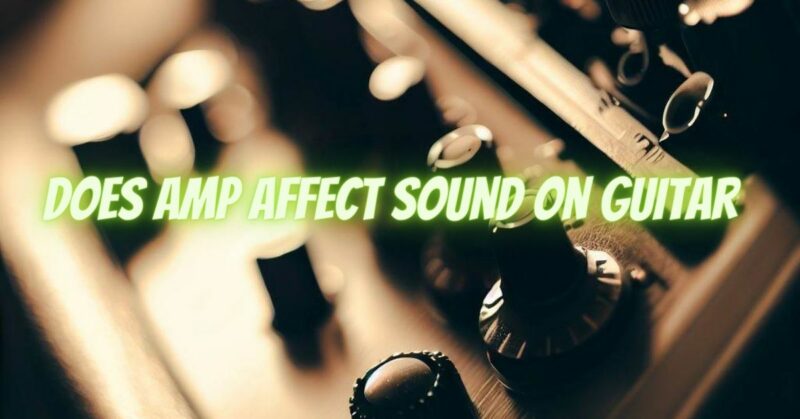The relationship between a guitar and its amplifier is a symbiotic one, a synergy that defines the sonic landscape of modern music. Amplifiers have long been a staple in the guitarist’s toolkit, contributing not only to the volume but also intricately shaping the very essence of the sound that emanates from the instrument. This article delves into the pivotal role that amplifiers play in influencing the sound of a guitar.
The Anatomy of Sound Amplification
Before exploring the influence of amplifiers on guitar sound, it’s crucial to understand their fundamental function. An amplifier is an electronic device that takes the relatively weak electrical signal generated by a guitar’s pickups and magnifies it to a level suitable for driving speakers. This transformation of signal strength allows the guitar’s sound to reach audiences with the desired impact and presence.
Tonal Sculpting: A Symphony of Controls
Amplifiers are far more than mere volume boosters; they are intricate tools that empower guitarists to craft their signature tones. The controls found on amplifiers, such as equalization (EQ) knobs, gain settings, and tone-shaping options, provide an extensive palette for manipulating sound characteristics.
- Equalization (EQ): Amps typically offer bass, midrange, and treble EQ controls. These allow guitarists to emphasize or attenuate specific frequency ranges, enabling them to fine-tune the tonal balance. Want a warm, bass-heavy blues tone or a sharp, cutting rock sound? EQ adjustments make it possible.
- Gain and Distortion: The gain control on an amplifier governs the degree of distortion or overdrive in the sound. Lower gain settings yield cleaner tones, while higher settings introduce harmonic richness and sustain. This aspect is pivotal for genres like hard rock and metal, where distortion defines the sonic identity.
- Tone Controls: Tone knobs often provide nuanced adjustments, allowing for subtle shifts in timbre. They can transform a dull sound into a bright, sparkling one or add warmth and depth to a bright instrument.
Amplifier Types: Pioneers of Sonic Diversity
Amplifiers come in various types, each bearing a unique sonic signature:
- Tube Amplifiers: Renowned for their warm, organic, and harmonically rich sound, tube amps utilize vacuum tubes to amplify the signal. They are celebrated for their responsive dynamics and subtle distortion when pushed.
- Solid-State Amplifiers: These utilize transistors and other solid-state components for amplification. They offer a cleaner, more precise sound and are often favored for their reliability and affordability.
- Digital Modeling Amplifiers: Employing advanced digital technology, these amps can emulate the characteristics of various classic amplifiers. They offer unparalleled versatility, enabling guitarists to access a wide array of tones in a single unit.
The “X-Factor” in Sound Enhancement
While the amp undeniably plays a pivotal role in shaping a guitar’s sound, the idea of whether an amplifier makes a guitar sound “better” is subjective. Sound is an art form, and personal preference, genre, and context all influence the perception of better sound. The amplifier serves as a catalyst for translating a guitarist’s creative intent into audible reality.
In Search of the Perfect Match
Rather than focusing solely on whether an amplifier improves guitar sound, it’s more fruitful to seek an amplifier that complements the musician’s style and aspirations. Experimentation with different amplifier types, settings, and effects can lead to a deeper understanding of how to harness the power of amplification to achieve the desired sonic result.
Amplifiers wield an undeniable influence over the sound of a guitar, a partnership that has shaped the musical landscape for decades. From the tonal sculpting abilities offered by EQ controls to the distinctive characteristics of various amplifier types, the amplifier is a dynamic tool in the hands of a guitarist. While the notion of whether an amplifier enhances guitar sound is subjective, the undeniable truth is that the amplifier is an enabler of artistic expression, turning melodies into resonant emotions that reverberate through time and space.


